| Spotlight
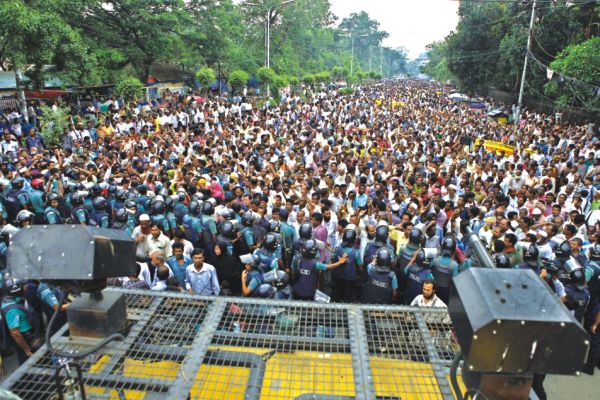
Education Gone Wrong
Saad Adnan Khan
Photos : Star File
In a country, where teachers are treated like terrorists, we are not only left with feelings of rage and hatred, but also with the gnawing need to go back to some basic lessons in life. Our rage boils down to panic, as the State rubs its power on our face, this time, by terminating a demonstration of non-government primary school teachers, who demanded recognition and improved economic and living standards for themselves. It is old news that political parties hold hartals and demonstrations only when their own ministers are jailed or go missing, but not when people suffer due to electricity, water and gas crises and when they die in road accidents. However, it is one thing to be indifferent and clueless regarding the struggle of the ordinary mass, and it is another to take actions that are mindless, display extreme disrespect and disregard towards education and throttle a group of harmless individuals with unjustified violence. Should we condone the act of the police beating up and assaulting the unarmed fifty thousand teachers? Primary school is the place where we learn our first lessons in life- one of them is about respecting our elders and teachers. The indifference of our politicians and the brutality of the police force proved how easily these figures of power have regretfully and shamelessly forgotten such a rudimentary and important lesson of life.
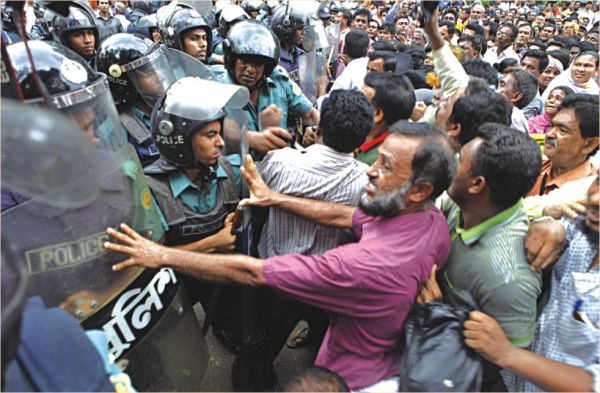
The police attacked unarmed teachers demanding job regularisation.
The non-government primary school teachers' demand from the government was one-point: regularising the jobs of more than ninety six thousand non-government primary school teachers of twenty four thousand non-government or registered primary schools all over the country. The job responsibilities of government and non-government teachers are exactly the same. They put in similar efforts and carry out similar administrative tasks. However, very few similarities exist when it comes to the salary and the benefits the teachers get. According to present news reports, the teachers in government schools earn an average monthly salary of twelve thousand taka, excluding benefits and allowances such as house rent, medical insurance, yearly increment and raises etc. that are added to the salary. The average monthly salary of non-government teachers is around five thousand taka. They only get medical insurance and no other benefits. If their jobs get regularised, the teachers of non-government schools will get the same benefits as that of government schools. It will take four hundred and twenty crore taka from the national budget to regularise the jobs of the non-government primary teachers. According to Mohammad Abdur Rahman Bachchu, member secretary of the Bangladesh Non-Government Primary School teachers' Association and leader of the demonstration, teachers will not have a problem if the government decides to spread out the total amount in three years to bring about the regularisation, as long as Prime Minister Sheikh Hasina gives her word in doing so at present.
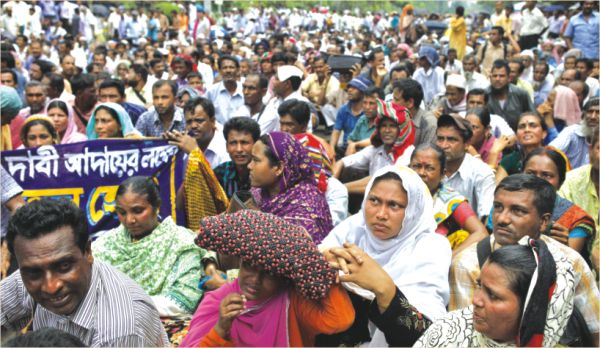
Non-government primary teachers earn an average monthly salary of five thousand taka.
Attention was given to these details much later, after the teachers went through an inhuman ordeal with the police force. In fact, the police brutality caused the death of one teacher, while injuring many others. It all started on May 14, 2012 when teachers from different corners of the country came to Dhaka to take part in the demonstration, which took place under the banner of the Bangladesh Non-Government Primary School teachers' Unity Council. They started to gather from six in the morning at the Central Shaheed Minar, where they did a sit-in programme in the scorching heat of summer. The next day, they wrote a memorandum, stating their one-point demand. They wanted to submit the memorandum to the Prime Minister themselves, and thus started their walk from Shaheed Minar to the PM's office. It was during this procession that the police stopped them at Shahbagh crossing and would not let them continue with the march. The police used coloured and hot water to disperse the crowd and later on stooped to using batons and sticks to beat the teachers present there. Many of them were jailed, injured and hospitlaised. On May 16, Azizur Rahman, one of the wounded teachers succumbed to his injuries and passed away. Azizur Rahman was the headmaster of Char Bhatiany Registered Primary School in Jamalpur and he was also a freedom fighter. Later on the same day, the teachers sat with the Primary and Mass Education Minister Dr Md Afsarul Ameen and State Minister for Primary and Mass Education, Md Motahar Hossain at the Ministry of Primary and Mass education. The Ministers assured them that there will be a positive outcome of this event.
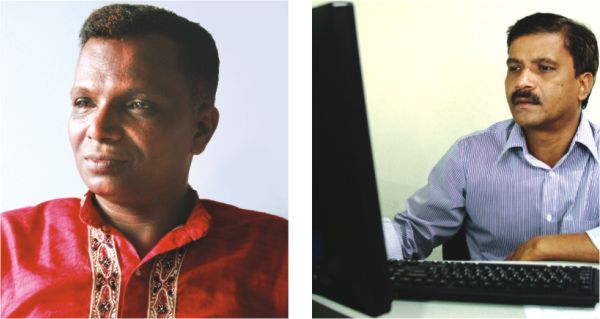 |
Mohammad Abdur Rahman Bachchu |
Dr Asif Nazrul, Photo: Saad Adnan Khan |
Teachers are supposed to be the most respected members of society. When they are kicked and trampled under boots of the police, it reflects upon how low, we, as a nation have stooped. The government does not protect the ones who selflessly serve to build the foundation of the country.
Mohammad Abdur Rahman Bachchu, says, “My hand was burned and many of my colleagues were injured. But I am not scared. I will keep on fighting. We are teachers, and not a political group, and we know that we have the right to do the demonstration. Not a single political figure expressed grief over the incident and no one took any action against the police men who beat us up for no reason. Such violence only made our movement stronger. The action of the police force only tarnished the government a bit more. We have given an ultimatum to the government. If Prime Minister Sheikh Hasina does not meet our demand before May 31, we will close down all non-government primary schools from June 16. The government will be responsible for the demise that will take place in the education sector.” According to Bachchu, Minister Motahar Hossain, when confronted by a group of teachers, at a seminar in Rangpur on May 22, insensitively stated that Azizur Rahman, the deceased teacher, was not even present at the demonstration, when newspapers had already published pictures of him lying injured at the demonstration.
Sheikh Abdus Salam Mia, secretary general of the Bangladesh Registered Non-Government Primary School teachers' Association says, "We have appealed to the government again and again, but the government still chooses to ignore us. Sheikh Hasina should complete Bangabandhu Sheikh Mujibur Rahman's incomplete mission of regularising the jobs of non-government schools.” According to reports, in 2005, Sheikh Hasina had addressed non-government primary school teachers and promised to regularise their jobs if her party came to power.
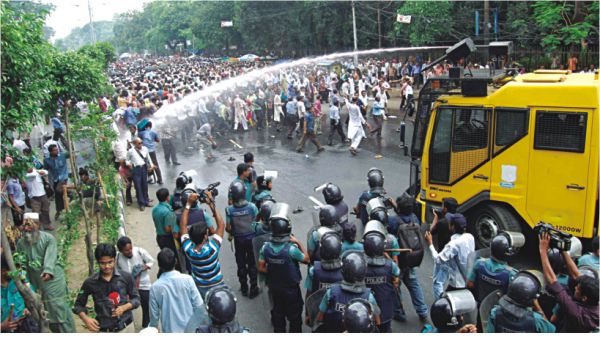
The police used coloured and hot water in the heat to disperse the crowd of teachers.
Dr Asif Nazrul, Professor of Department of Law at the University of Dhaka says, “My office is right next to the Shaheed Minar, and I heard the teachers on the speakers, literally begging the Prime Minister to respond to their appeal. The way the teachers were treated by the police force is absolutely unacceptable. What is worse is that the government acted in a fascist way, even when the teachers did everything in a peaceful and orderly manner. A society's primary focus should be on education, and more so on primary education. If you cannot give the primary teachers benefits and the protection they deserve, how can one expect the poor, hungry teachers to provide the highest level of service? Moreover, a freedom fighter died. Is this how a government functions when it talks about liberation war and war trials? This has been an extreme violation of human rights, and not a single statement has been issued by the Human Rights Commission.” Asif Nazrul wrote an essay called Shikkhoker bet, police er lathi (The cane of the teacher, the baton of the police) on the demonstration that was published in the Prothom Alo on May 19.
On May 20, fifteen noted educationists and civil society members of the country expressed grief and concern over the violence that the primary teachers had to deal with. They stated that there should be human rights training for law enforcers of the country.

On the same day, the Prime Minister, via video conference, encouraged five hundred primary schools and five hundred secondary schools to install multi-media methods of teaching in classrooms. She also encouraged the non-government sector to step forward and embrace the idea of a 'digital' Bangladesh.
Education still needs to be decentralised, so that students outside Dhaka can have access to proper education. Added to that, the education of primary school children is now in jeopardy too. Making promises of a 'digital' Bangladesh, calling hartals and disrupting the education system have become trends that our politicians entertain themselves with. We, the commoners live in a separate world, where teachers are beaten up. The teachers being the mentors and guides, who are supposed to lead students towards enlightenment, were ruthlessly assaulted. When people of hope are broken by people of power, what are we left with?
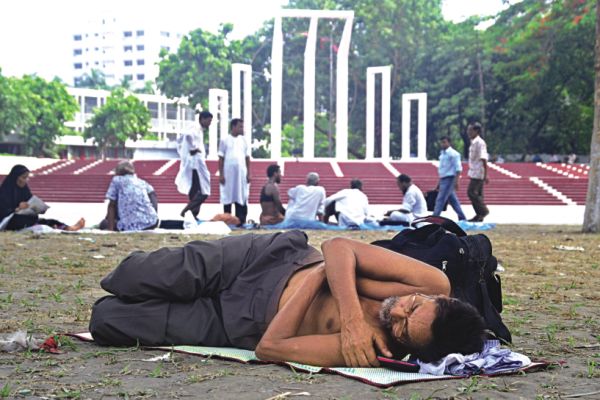
This elderly 60-year-old, who has been a teacher for the last 29 years, stayed at the Shaheed Minar under the open sky for four days. He arrived in Dhaka from Manda upazila of Naogaon to take part in the teachers' demonstration demanding regularisation of their jobs. Unable to properly provide for his family back home, he could not afford a hotel room for himself in Dhaka either.
|
